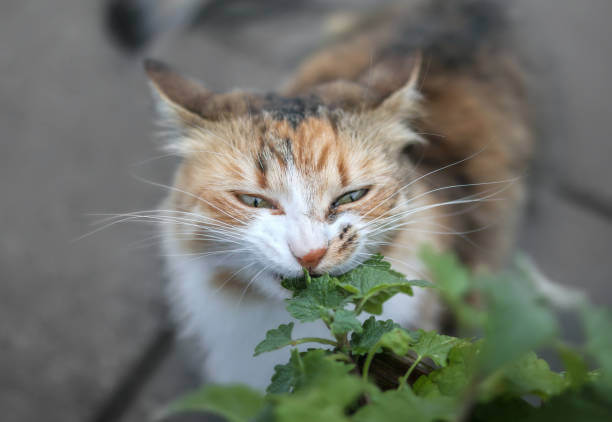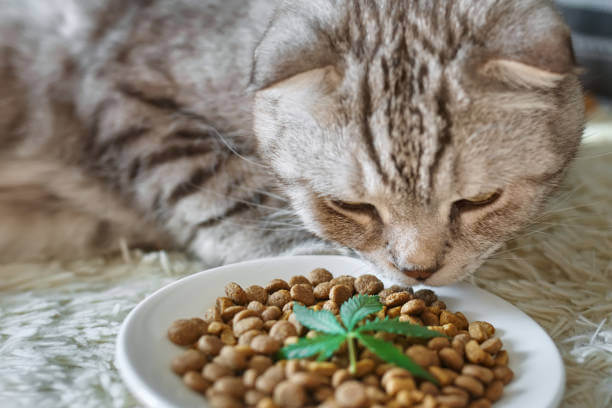Find out in this article on the topic “Can Cats Eat Cilantro?” Learn about potential health benefits and risks, as well as how much is safe for your cat to consume. Keep your cat happy and healthy with expert information from our guide.Cats are known for their curious nature, and it’s no surprise that they may take an interest in the foods we eat. As a responsible cat owner, it’s important to be aware of what is safe and suitable for your feline friend’s consumption. One such question that often arises is whether cats can eat cilantro. In this article, we will explore the topic of cats and cilantro, examining its potential benefits and risks.
The Basics: What is Cilantro?
Before delving into whether cats can consume cilantro or not, let’s start with the basics. Cilantro, also known as coriander or Chinese parsley, is a popular herb used in various cuisines around the world. It has a fresh and citrusy flavor profile with hints of sweetness and spice. Apart from being used as a culinary herb, cilantro also offers several health benefits for humans due to its rich antioxidant content and potential anti-inflammatory properties.
Cats’ Unique Dietary Needs

As obligate carnivores, cats have specific dietary requirements that differ from omnivorous animals like humans or dogs. Their bodies are designed to thrive on a diet primarily consisting of animal-based proteins. While small amounts of certain fruits and vegetables can be beneficial for cats, their digestive systems are not built to process plant matter in large quantities.
The Safety of Cats Eat Cilantro
When it comes to cilantro specifically, the good news is that it is generally considered safe for cats when consumed in moderation. However, it’s essential to keep a few key points in mind:
- Individual Sensitivities: Just like humans, cats can have individual sensitivities or allergies to certain foods. If you’re introducing cilantro to your cat’s diet for the first time, it’s wise to start with a small amount and monitor their reaction closely. If you notice any signs of digestive upset, such as vomiting or diarrhea, it’s best to discontinue feeding cilantro.
- Avoid Large Quantities: While small amounts of cilantro are generally safe, it’s crucial not to overdo it. Feeding your cat excessive amounts of cilantro or any herb can lead to gastrointestinal issues or even disrupt their natural dietary balance.
- Consult Your Veterinarian: If you have concerns about introducing any new food into your cat’s diet, including cilantro, it’s always a good idea to consult with your veterinarian beforehand. They can provide personalized advice based on your cat’s age, health condition, and individual needs.
Potential Benefits of Cats Eat Cilantro
While cats derive most of their nutritional needs from animal proteins, some herbs like cilantro may offer certain health benefits in moderation. Here are a few potential advantages of introducing small amounts of cilantro into your feline friend’s diet:
1. Rich in Antioxidants
Cilantro contains antioxidants that can help combat free radicals in the body, which may contribute to overall well-being and support a healthy immune system in cats.
2. Freshens Breath
Cilantro has natural breath-freshening properties. Adding a small amount of chopped cilantro to your cat’s food might help combat bad breath caused by dental issues or other factors.
3. Adds Variety and Enrichment
Introducing different flavors and textures into your cat’s diet can provide mental stimulation and enrich their eating experience. Incorporating small amounts of herbs like cilantro can add variety without compromising their nutritional balance.
It’s important to note that these potential benefits should not replace a balanced and species-appropriate diet for cats but rather serve as complementary additions in moderation.
Risks and Precautions

While cilantro is generally safe for cats, there are a few risks and precautions to be aware of:
1. Allergic Reactions
As mentioned earlier, some cats may have individual sensitivities or allergies to cilantro. If you notice any adverse reactions after introducing it into their diet, discontinue use and consult your veterinarian.
2. Pesticide Residues
When offering cilantro or any other fresh herbs to your cat, make sure it is thoroughly washed to remove any potential pesticide residues. Opting for organic cilantro can further minimize the risk of exposure to harmful chemicals.
3. Other Toxic Plants
If you have a herb garden or indoor plants, ensure that none of them are toxic to cats. While cilantro itself is safe, some other plants often grown alongside it may be toxic if ingested by felines.
Important Things to Keep in Mind
Overall, it is generally safe to introduce cilantro into your cat’s diet in small amounts. However, there are a few key points to keep in mind:
- Start with small quantities and monitor for any adverse reactions.
- Avoid feeding cats large amounts of cilantro or any other herbs.
- Consult your veterinarian if you have any concerns – Make sure the cilantro is organic and pesticide-free,
- and check for any other potentially toxic plants in the area.
By following these guidelines, you can ensure that your cat enjoys the potential health benefits of cilantro without any risks. With a little research and common sense, you can provide your feline friend with an enjoyable and nutritious diet.
Final Thoughts
Cilantro can be a great addition to your cats’ diet, but make sure to do your research and consult with your veterinarian first. When introducing cilantro into their diet, start with small amounts and monitor for any adverse reactions. Additionally, opt for organic cilantro whenever possible and check your garden or household plants for any toxic species. With the right precautions in place, you can provide your cat with the nutritional benefits of cilantro while keeping them safe.
Remember, moderation is key when it comes to any new food in your pet’s diet, and cilantro is no exception. With a little research and caution, you can help keep your furry friend healthy and happy for years to come.
FAQS
Q: Are there any risks associated with feeding cats cilantro?
A: Yes, there are some potential risks to consider when introducing cilantro into your cat’s diet. Make sure to start with small amounts and monitor for any adverse reactions. Additionally, opt for organic cilantro whenever possible and check your garden or household plants for any toxic species.
Q: Are there any potential health benefits associated with feeding cats cilantro?
A: Yes, small amounts of cilantro may offer certain health benefits in moderation. Cilantro contains antioxidants that can help combat free radicals in the body and freshen breath naturally. Additionally, introducing different flavors and textures into your cat’s diet can provide mental stimulation and enrich their eating experience.
Q: Is it safe to give cats cilantro daily?
A: We recommend consulting with your veterinarian first before introducing any new food, including cilantro, into your cat’s diet. Generally speaking, moderation is key when it comes to cilantro and other herbs. Small amounts of cilantro may be safe for cats but large amounts can have adverse effects on their health.
Q: What should I do if my cat has an adverse reaction after eating cilantro?
A: If you notice any adverse reactions after introducing cilantro into your feline’s diet, discontinue use and consult with your veterinarian. They can help diagnose the issue and provide personalized advice to ensure your cat’s safety and well-being.
Conclusion
Cilantro can be a safe and beneficial addition to your cat’s diet in moderation. However, it is important to take the necessary precautions when introducing any new food into their diet – this includes consulting with your veterinarian and monitoring for potential allergic reactions. With the right research and caution, you can help keep your feline friend healthy and happy for years to come.
